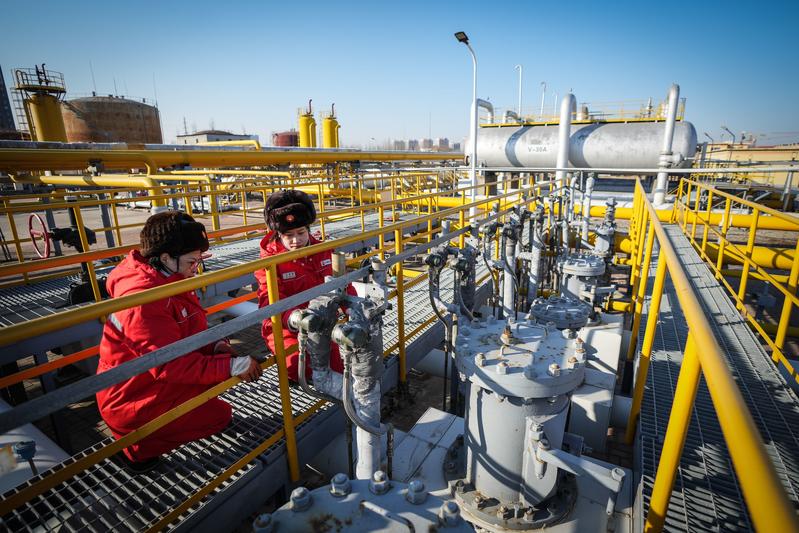 Employees check natural gas pipelines at PetroChina's Liaohe oilfield in Panjin, Liaoning province, on Monday. (PHOTO / XINHUA)
Employees check natural gas pipelines at PetroChina's Liaohe oilfield in Panjin, Liaoning province, on Monday. (PHOTO / XINHUA)
China's rapid economic recovery is expected to boost global commodity markets while leading the world economy to recovery, said foreign executives, market observers and analysts.
Mike Henry, CEO of Australian mining giant BHP Group, said China will be a stabilizing force for commodity demand this year and he expects to see increasing domestic demand drive economic growth in China, the world's second-largest economy that accounts for more than 50 percent of global demand for raw materials.
"All the fundamentals are in place in China for continued economic growth over the next 20 years, while China is also going to provide a bit of stability to global growth over the next year," he said.
"It is expected that China's steel sector will grow in 2023 as the economy starts responding to government stimulus efforts and steel output. The company will also expand cooperation with its Chinese partners."
Zhu Yi, a senior analyst with metals and mining at Bloomberg Intelligence, a market monitor, echoed his sentiments, saying China's infrastructure push and reopening may be on course to bolster demand, compensating for tepid growth elsewhere.
"While metals demand outside China looks to be at risk of a possible recession, China's policy support for the property sector could set the tone for aggressive easing this year," she said.
"Together with government countercyclical support to boost infrastructure spending, we have been expecting China's demand for metals would improve from 2022.China's aluminum demand, for example, is expected to grow 2 percent this year compared with 1 percent in 2022, while steel demand will return to growth compared with a decline in 2022."
In addition to BHP, French environmental solutions provider Veolia Group also expects strong growth from the Chinese market in 2023, as the ever-optimizing policies create massive opportunities despite the backdrop of a possible global economic recession.
Veolia remains optimistic on China's economy and its operations in the country this year, not only because of its market size but also its speed of development, said Christophe Maquet, senior executive vice-president of Veolia's Asia-Pacific region.
"We are confident and optimistic about our operations in China's water, solid waste and energy management sectors in 2023," he said.
According to Fatih Birol, executive director of the International Energy Agency, China's economy could be poised for a stronger-than-anticipated rebound that will boost demand boost for oil and natural gas.
There are some "first indications" from China that growth will accelerate faster than previous expectations and the nation is projected to deliver around half of a forecast increase in global oil demand of almost 2 million barrels a day this year, Birol said.
"This may be even more if the Chinese economy advances stronger than we assume, while rising Chinese demand will also have a major impact on liquefied natural gas as volumes currently coming to market are among the lowest in history, according to IEA data," he said.
"Jet fuel consumption in China, on the other hand, is already very strong and that's likely to increase overall oil demand if it continues to grow at the same pace."
"We are very confident in the Chinese economy and the strength of the leadership and the government and the people of China," said Haitham Al Ghais, secretary general of the Organization of Petroleum Exporting Countries.
Due to good fundamentals, effective macro-policy response and optimized COVID-19 prevention and control policies, China's economy is expected to grow by 5.2 percent in 2023, 0.8 percentage point higher than the October 2022 forecast, according to a projection by the International Monetary Fund.
In addition to the IMF, international investment banks and financial institutions, including Morgan Stanley and Goldman Sachs, also forecast a rebound in activity in the country. Morgan Stanley raised its outlook for China's GDP growth in 2023 from 5.4 percent to 5.7 percent.
The rapid rebound in mobility and the alignment of COVID-19 management, alongside economic and regulatory policies to promote growth are major reasons for the upward revision of the forecast, Chetan Ahya, chief Asia economist at Morgan Stanley, was quoted as saying by Xinhua News Agency.


